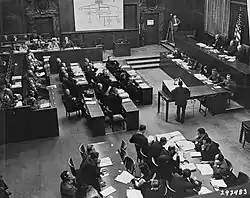RuSHA trial
The RuSHA trial against the SS racial policies (officially, United States of America vs. Ulrich Greifelt, et al) was the eighth of the twelve trials held in Nuremberg by the U.S. authorities for Nazi war crimes after the end of World War II. These twelve trials were all held before U.S. military courts in their occupation zone in Germany, not before the International Military Tribunal, although they took place in the same rooms, at the Palace of Justice. The twelve U.S. trials are collectively known as the "Subsequent Nuremberg Trials" or, more formally, as the "Trials of War Criminals before the Nuremberg Military Tribunals" (NMT).[1]
| RuSHA trial | |
|---|---|
 First day of the RuSHA trial, October 20, 1947 | |
| Indictment | July 7, 1947, Nuremberg |
| Decided | March 10, 1948 |
In the RuSHA Trial, the 14 defendants were all officials of various SS organizations responsible for the implementation of the Nazi "pure race" programme: including RuSHA (Rasse- und Siedlungshauptamt, the "Race and Settlement Main Office"); the office of the Reich Commissioner for the Consolidation of German Nationhood (Reichskommissar für die Festigung des deutschen Volkstums, RKFDV; a post held by Heinrich Himmler); the Repatriation Office for Ethnic Germans (Volksdeutsche Mittelstelle, VoMi); and the Lebensborn society. The charges centered on their racial cleansing and resettlement activities.
The judges in this case, heard before Military Tribunal I, were Lee B. Wyatt (presiding judge), Associate Justice of the Supreme Court of Georgia; Daniel T. O'Connell of the Superior Court of Massachusetts, and Johnson T. Crawford from Oklahoma. The Chief of Counsel for the Prosecution was Telford Taylor. The indictment was served on July 7, 1947; the trial lasted from October 20, 1947 until March 10, 1948.[1]
Indictment
- Crimes against humanity in furtherance of "racial purity" programmes by kidnapping children, encouraging or compelling "non-Aryan" pregnant women to undergo abortions, providing abortion services and removing cases of abortion from the jurisdiction of Polish courts; plundering, deportation of populations from their native lands in occupied countries and resettling of so-called "ethnic Germans" (Volksdeutsche) on such lands, sending people who had had "interracial" sexual relationships to concentration camps, and general participation in the persecution of Jews.
- War crimes for the same reasons.
- Membership of a criminal organization, the SS.
All defendants were indicted on counts 1 and 2. Inge Viermetz was excluded from count 3. All defendants pleaded "not guilty".[1]
Defendants
| Name | Function | Charges | Sentence | ||
|---|---|---|---|---|---|
| 1 | 2 | 3 | |||
| Ulrich Greifelt | Chief of Staff of RKFDV | G | G | G | lifetime imprisonment; died 1949 |
| Rudolf Creutz | Deputy to Greifelt | G | G | G | 15 years; released 1955-died 1980 |
| Konrad Meyer-Hetling | Office head in RKFDV | I | I | G | Time already served (since May 27, 1945); released after the judgment; died 1973 |
| Otto Schwarzenberger | Office head in RKFDV | I | I | G | Time already served (since May 2, 1945); released after the judgment |
| Herbert Hübner | Chief of Poznań office of RKFDV and representative of RuSHA in western Poland |
G | G | G | 15 years; released 1951 |
| Werner Lorenz | Head of VoMi | G | G | G | 20 years; released 1955-died 1974 |
| Heinz Brückner | Office head at VoMi | G | G | G | 15 years; released 1951 |
| Otto Hofmann | Head of RuSHA until April 20, 1943, later head of the SS in southwestern Germany |
G | G | G | 25 years; released 1954 died 1982 |
| Richard Hildebrandt | Head of RuSHA, Hofmann's successor | G | G | G | 25 years; turned over to Polish authorities and executed in 1952 |
| Fritz Schwalm | Chief of Staff of RuSHA and head of the "Immigration Office" (Einwandererzentrale, EWZ) in Łódź |
G | G | G | 10 years;released 1951 |
| Max Sollmann | Head of the Lebensborn society | I | I | G | Time already served (since July 6, 1945); released after the judgment |
| Gregor Ebner | Head of Health Dept. of Lebensborn | I | I | G | Time already served (since July 5, 1945); released after the judgment; died 1974 |
| Günther Tesch | Head of Legal Dept. of Lebensborn | I | I | G | Time already served (since May 13, 1945); released after the judgment |
| Inge Viermetz | Deputy to Sollmann | I | I | acquitted | |
I — Indicted G — Indicted and found guilty
The four Lebensborn members were not found guilty on counts 1 and 2 of the indictment. The tribunal considered the Lebensborn society not responsible for the kidnapping of children, which was carried out by others.[1]
Greifelt died in the Landsberg prison on February 6, 1949. Hildebrandt was turned over to Polish authorities. He was put on trial for war crimes again in Poland and sentenced to death. He was hanged on March 10, 1952. Hübner, Brückner, and Schwalm were released in 1951. Also in that year, the sentences of Hofmann and Lorenz were reduced to 15 years, and that of Creutz to 10 years. Hofmann was released in 1954.
References
- "Archived copy". Archived from the original on September 8, 2002. Retrieved January 21, 2005.CS1 maint: archived copy as title (link)
External links
| Wikimedia Commons has media related to RuSHA Trial. |
- Trial proceedings from the Library of Congress
- Description from the U.S. Holocaust Memorial Museum
- Notes on the trial
- Lebensborn (in German)